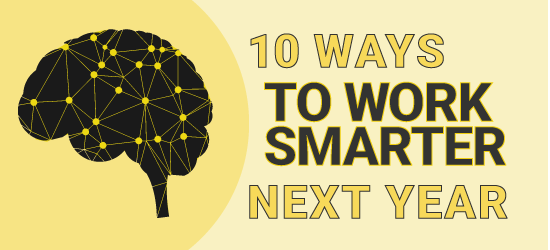
Learning professionals often wear many hats, from client interface and management to design and development. It can make you feel like you’re drowning in work. Working smarter not harder is an elusive goal, but one worth trying to achieve.
What does working smarter mean for you? Do you want a better work-life balance? Are you seeking to improve your ability to focus? Do you want time to work on new skills? Whatever your reasons, here are working smarter tips I’ve gathered from books, podcasts and articles that I come across.
1. Take a Personal Retreat
Many productivity gurus say it is imperative to take a short annual retreat. It is the best way to reflect on your priorities and to determine what you want to pursue in the coming year. Do this retreat in solitude and offline, using analog tools only (paper and pencil, that is). Although you may not be in a situation where you are able to get away, perhaps you can do this in one long day. The goal of a personal retreat is to gain clarity about your life.
2. Leave Head Space for Solving Problems
If you’re an obsessive scheduler, be sure to leave holes in your calendar for creative problem solving. This involves intentionally taking time to think about a challenge you are facing. Rather than deal with your challenges in a random way, creating time and space for a focused approach will help you make breakthroughs.
3. Adopt a 168 Hour Mindset
Everyone has 168 hours in a week. It seems like a lot, yet it just flies by. Keep that 168 hour metric in your awareness during the week. This may help you identify where you are unintentionally spending your time (an abundance of cat videos?). Then you can substitute low quality or unfulfilling activities with high quality, meaningful activities. You may want to track your time for awhile to understand how you really use it. Check out RescueTime or Toggl for this. They have free plans.
4. Plan for a 12 Week Year
In the book, The 12 Week Year, the authors make a convincing case that annualized thinking is flawed. Instead of planning for a year, they recommend treating each new quarter as though it is a year. Planning for shorter time frames has benefits. It is easier for our minds to grasp things that need to be done in a 12-week period. Also, the urgency and motivation for achieving your goals occurs every 12 weeks rather than every 12 months.
5. Improve Your Focus
A focused mind is the best tool you have for working smarter. Consider the ability to focus as a skill that you can develop. There seem to be a lot of recommendations on ways to improve your focus. Here are a few.
- Listen to music for ten minutes before you work. Then turn it off.
- Prepare your mind by taking a few deep breaths and relax before you engage in work.
- Close down things that will distract you, like social media.
- Create timed periods of focus and increase the amount of time by a few minutes each day.
- If you work with others, use a signal, like a sign, to let them know that you are in deep focus mode and cannot be disturbed.
- Practice meditation to train your mind to focus.
6. Avoid Busyness
Learn to differentiate between high priority tasks and tasks that just keep you busy. Don’t let completing volumes of work be your measure of success. Rather, focus on completing the most important work—the work that has impact—the work that moves the needle.
7. Address the Five Areas of Productivity
Asian Efficiency, a company that specializes in productivity, recommends having an effective system and tool for the five productivity areas of your life. These are: calendar, time tracker, contact manager, note taker and task manager. An example of a system for note taking might be to audio record new ideas on your phone while you are doing errands, then transcribe them to Evernote later. After you create your system, the hard part is being consistent with it.
8. Use Habit Stacking to Build New Habits
For many of us, working smarter means eliminating bad habits and building better ones. That’s where habit stacking comes in. To develop a new habit, piggyback it onto something you already do. This enables you to link the new habit to an established routine. Because all behaviors start with a trigger, your established routine becomes the trigger. For example, if staying hydrated helps you work more effectively, add drinking a glass of water to the routine you perform when you sit at your desk and turn on your computer.
9. Take Short Bursts of Physical Activity
I hate to stop working when I’m in the zone, but I know it’s important to get up and move around. If you do jumping jacks, running up and down the stairs or similar activities, it resets your body and mind—at least for awhile. A burst of exercise (called microbursts) can give you an “improved mood, lower levels of fatigue, and even fewer cravings…,” according to behavior scientist, Raphaela O’Day.
10. Gamify Your Goals
Can you benefit from adding a little gamification toward reaching your goals? If so, download Dave Seah’s Concrete Goals Tracker to use every week. It’s a two part form, on which you list your most important tasks and a weekly tracker. You then fill out the little bubbles when you complete a task (you know you love that) and give yourself points. It’s set up so that tangible results get more points than supporting tasks. At the end of the week, add up your points and see how you did.
What are your favorite working smarter hacks? Share in the comments below.

You’re welcome, Michelle. Me too
Connie,
Thank you for this list. I plan to use this to make improvements in 2019 — or rather, each quarter in 2019!